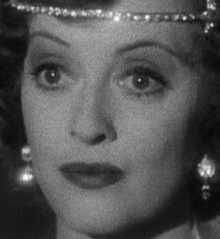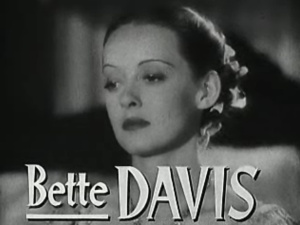Rick’s Journal — MY FILM CAREER
The prof who brought her to speak to us — brought her to the UCLA campus in his own car — came into the room alone and told us that she was outside having a final cigarette. He also told us — would she have killed him if she knew? — that she was “a little nervous” about her first classroom appearance.

in Mr. Skeffington
He went outside and brought Bette Davis into us. I was sitting in the fourth row of an eight-row classroom. I was that close to the actress I had admired since my childhood, since the time when my mother and my aunts referred to Bette Davis movies as “deep pictures.” In reality most of her films were melodramas lacking, as were most Hollywood films of the era, psychological sophistication or profundity. I think that by deep, my family meant somber, with the possibility — rare then — of an unhappy ending. But Bette Davis starred in some good films. She was three times directed by William Wyler. During her major creative years, 1936-1952, she certainly had overall, scripts of better quality than did Greta Garbo, who spent her entire career elevating hokum. Of course Davis, too, did her share of making mediocre material watchable and interesting. From her earliest screen appearances it is impossible NOT to watch Bette Davis once she enters a scene.
On this evening she was wearing a dark blue semi-formal dress. She and our teacher sat in chairs on either side of the small desk at the front of the room. She did not begin with a presentation. He introduced the person who, for once, needed no introduction, then invited us to ask questions.
I remember her responses about four films.
Storm Center. She displayed a bitterness about the fate of this film in which she played the town librarian who refused to remove a book from the library’s shelves when someone claimed that it promoted communistic ideas. The Legion of Decency, at the time a powerful force on filmmaking and film distribution, had seen fit to give Storm Center a designation of “condemned,” a category usually reserved in that time for sexy French and Italian imports. Storm Center, not that well received by critics, also did not perform well at the box office. Rightly or wrongly, Davis blamed the Legion of Decency for the film’s failure. “Once you get that Catholic rating…” she said, there was no chance of success.
Mark Harris in his book Five Came Back suggests that there were those in Hollywood who actively worked to punish Davis for her participation in the film and that this played a part in her difficulty finding roles in this crucial period of her career. (Storm Center, Daniel Taradash, 1956.)
The Virgin Queen. Davis was particularly interesting talking about this mid-fifties film which had a mixed critical success and was a box office failure. I had always felt that she and the film were better than the conventional wisdom; and — lo! — she certainly agreed with me. But she gave no indication that she regarded it as meeting less then her highest standards. I would venture that she estimated it as equivalent to her Private Lives of Elizabeth and Essex (1939). She is not that good (the earlier outing is one of her outstanding performances). Neither is the film, though its brilliant color is handsome, and it tries for a thorough sense of period. Directed by Henry Koster, it features Richard Todd as Raleigh and Herbert Marshall as Leicester. (The Virgin Queen, Henry Koster, 1955.)
Another Man’s Poison. A student in our class remarked to her that she had often read that in her performance in Another Man’s Poison, Bette Davis had intended to parody her films and the kind of role she usually played. She did not at first grasp the intent of the question; but — OH! — when she did: When the questioner explained what she was asking, Davis said, “You mean making fun of my own work? I would NEVER do such a thing.” Another Man’s Poison, Irving Rapper, 1951.)
All About Eve. Hearing the actress speak briefly about the famous Mankiewicz film, I became aware for the first time that performers had often not seen the completed versions of their films. That is probably no longer true. Davis was speaking to our group before VHS and DVD and streaming. But I wonder if sometimes today this still happens as I reflect on the fascination with which actors sometimes watch clips of their performances during award shows. They appear sometimes to be discovering and learning. It is only Barbra Streisand who can clearly be seen enthralled in admiration of her own work.
Bette Davis had been speaking to us of some of her films that she had never seen. She then said that she had seen Eve. “That is one I can sit through and never have to close my eyes.” She said only that about the film, and it was enough. (All About Eve, Joseph L. Mankiewicz, 1950.)
At another point in the evening one of the lesser lights in our class told Bette Davis that he was interested only in directing . “How long might I have to work at a silly-assed job like editing before I get to direct?” She was kinder than she might have been. She first snapped: “Editing is not a silly-assed job.” Then she only said, “Editing can create a movie, it can make or break a film.”
When the session was over, without her having smiled once, our prof thanked her; and, with the great woman sitting right there, said: “I think we would all prefer having heard honest pride to false modesty.”
See Rick’s Flicks post of 2/5/16 for a discussion of Bette Davis’ career, Rick’s Flicks’ choice of her greatest performances and choice for the single greatest one.
DAVIS QUOTE: On turning down the role of Mrs. Dudgeon in The Devil’s Disciple, she said that after twenty-five years in the business and two Academy Awards, “I’m damned if I’ll play Kirk Douglas’s mother.”
NEXT FRIDAY POST September 15
Until then,
See you at the movies,
Rick





